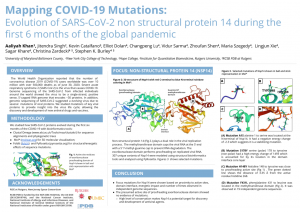Khan, Aaliyah: Mapping COVID-19 Mutations: Evolution Of SARS-Cov-2 Non-Structural Protein 14 During The First 6 Months Of The Global Pandemic
Title: Mapping COVID-19 Mutations: Evolution Of SARS-Cov-2 Non-Structural Protein 14 During The First 6 Months Of The Global Pandemic
Name: Aaliyah Khan
Home Institute: University of Maryland Baltimore County
Programs: RISE program, Protein Data Bank
Other contributors: Jitendra Singh, Kevin Catalfano, Elliott Dolan, Changpeng Lu, Vidur Sarma, Zhuofan Shen, Maria Szegedy, Lingjun Xie, Christine Zardeck, Sagar Khare, Stephen K. Burley
Abstract: The World Health Organization reported that the number of coronavirus disease 2019 (COVID-19) cases worldwide was over 10 million with more than 500,000 deaths as of June 30, 2020. Severe acute respiratory syndrome two (SARS-CoV-2 ) is the virus that causes COVID-19. Genome sequencing of SARS-CoV-2 from infected individuals showed SARS-CoV-2 to be a single-strand, positive sense, 5’-capped RNA genome that encodes ~30 proteins. In addition, genomic sequences of SARS-CoV-2 from around the world documented that the virus is slowly evolving due to mutations occurring in ~30 viral proteins. Studying mutations of viral proteins will provide insight into the virus life cycle, allowing the discovery and development of new antiviral drugs and vaccines.
To conduct this study our team of research interns partnered with the RCSB Protein Data Bank. We studied how SARS-CoV-2 proteins evolved during the first six months of the COVID-19 pandemic by exploring amino acid sequence and 3D structure changes using various structural bioinformatics tools, including Clustal Omega (www.ebi.ac.uk/Tools/msa/clustalo/) for sequence alignments and phylogenetic trees; Mol* (molstar.org) for 3D molecular visualization; and Foldit (fold.it) and PyRosetta (pyrosetta.org) for analyzing the structural/energetic effects of mutations.
A key protein is non-structural protein 14 (Nsp14), which supports both viral genome capping with a 5’ 7-methyl-guanine cap and proofreading. A total of 307 unique sequence variants of Nsp14 were identified between late December 2019 and June 2020. These sequence variants were modeled using bioinformatics tools and analyzed using PyRosetta. Mutations of interest were chosen based on proximity to active sites or protein-protein interfaces, energetic impact, and the number of times observed in independently obtained genome sequences. The presumed active site of proofreading exoribonuclease domain showed no evidence of mutations. High level of conservation makes Nsp14 a potential target for antiviral agents.
Biography: Aaliyah Khan is a junior pursuing a bachelor’s of science degree in Chemistry with a minor in Computer science at the University of Maryland Baltimore County (UMBC). Her main research interests are in computational chemistry, materials science and environmental chemistry. She is an American Chemical Society (ACS) scholar, a program which aims to increase participation of minorities in Chemistry. She is president of the Chemistry/Biochemistry council of majors at UMBC, an organization that provides support and activities for students studying Chemistry and also hosts Chemistry outreach events in the local academic community. Aaliyah plans to attend graduate school after completing her degree.
